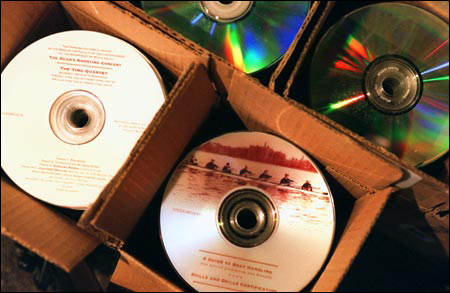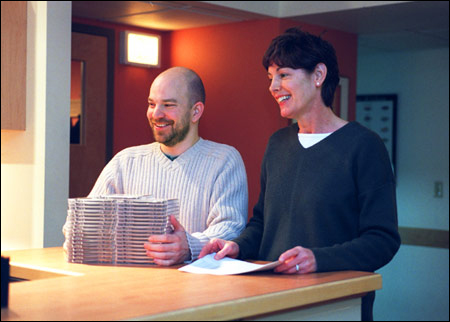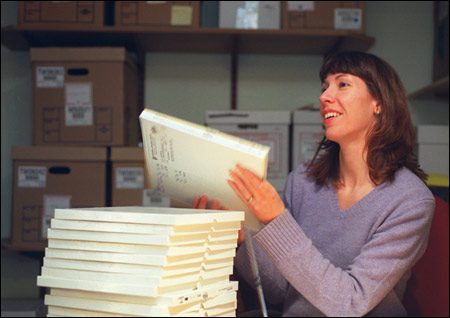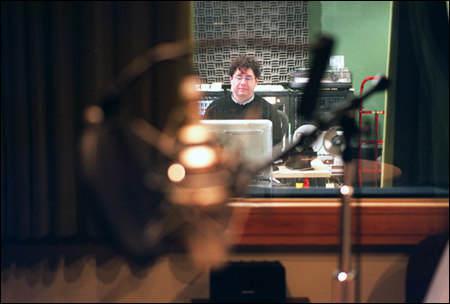Losing the hiss, scratches, and din of traffic
Media Production Center goes digital with audio treasures

Nearly 30 years ago, John Womack and a team of research assistants began interviewing retired industrial workers in the state of Veracruz, Mexico. The interviewees, who had worked in textile mills, breweries, cigar factories, and
See video of the
Media Production Center’s work:
Real/Quicktime
other manufacturing operations from the 1920s to the 1940s, were eyewitnesses to the industrialization of Mexico in the early 20th century, and their recollections constituted an important resource for the industrial and labor history of the country.
But that resource could exist only as long as Womack’s audio tapes remained intact, which, as he was troubled to learn, was a shorter time than he had anticipated.
“Finally somebody alarmed me by telling me that my tapes would disintegrate, and that I’d better get them transferred to CDs.”
So Womack, the Robert Woods Bliss Professor of Latin American History and Economics, brought his tapes to the Media Production Center (MPC). There, the staff converted the aging analog recordings into digital form, using state-of-the-art editing programs to minimize tape hiss, scratches, or the din of traffic outside a worker’s apartment. Womack now plans to have the 80 hours of interviews transcribed so that the material can be used by other scholars as well as students in his course on the history of Latin America.

The odyssey of Womack’s tapes with its happy dénouement is just one of the MPC’s many success stories. The center possesses the equipment and the expertise to deal with virtually any recording method, from Edison’s wax cylinders to the latest in CDs and DVDs. Vinyl LPs? No problem. Eight-track? Just pop in the cassette. Converting from European PAL video to the American NTSC format? They’ve got it covered.
“It’s all changing and it will continue to change. We’re always in midstream, never on the other shore, so to speak. It’s a very exciting process, but we’re not letting go of the old technology while we’re charging ahead into the new,” said the center’s manager Conrad White.
The center, which is a branch of the Department of Instructional Media Services, evolved as an offshoot of the Modern Language Center, and much of its business still revolves around helping instructors prepare audio and multimedia materials for their language classes. Many language teachers have had successful ongoing relationships with the MPC for many years.
Raymond Comeau, associate dean of the Extension School and an instructor in French, came to the MPC’s recording studio years ago to tape himself reading a selection of Charles Baudelaire’s “Les Petits poèmes en prose” to teach French pronunciation in his intermediate classes. Lately, he has reissued the recordings on CD and has prepared a collection of recorded radio interviews with Jean-Paul Sartre, Jacques Cousteau, Georges Brassens, and other French cultural icons for use in his course “Modern France through Biography.”

“Their willingness to help has been extraordinary,” said Comeau of the MPC. “They just do everything they can to add that extra element to the classroom, especially for the language classroom where sound recordings are so important.”
Binh Ngo, a preceptor in Vietnamese, has been working with the MPC since 1995 and says that the experience has been excellent. Ngo has brought Vietnamese speakers into the center’s studio to record nearly 10 hours of spoken exercises for his beginning textbook and between four and five hours for his intermediate text, a process he describes as time-consuming and complicated. Moreover, the center has cheerfully rerecorded new sets of exercises for revised editions of the texts.
“They have been very professional and effective,” Ngo said. “What they have done for me is amazing, and extremely useful for my courses. I have been so pleased.”
For the MPC staff, however, this sort of service is all in a day’s work.
“Our basic focus is supporting the teaching faculty with audio, video, and multimedia materials,” said Margaret Keyes, the MPC’s production coordinator. “But as the faculty and students continue to upgrade their hardware and software and to develop greater knowledge and sophistication, we have to continue to be on the cutting edge of the next technological step.”
Keeping up with technology means that the center must continually upgrade its equipment, but with this new equipment the staff is able to achieve more impressive results in less time with a smaller investment.
“For example, the editing system that we used back in the day – which was, what, five years ago? – was a $40,000 or $50,000 system, and now we can do the same thing or more with software that costs $500,” said Jeffrey Valade, an audio engineer who specializes in multimedia projects.
Using such state-of-the-art editing systems as Sonic Solutions or Final Cut Pro, the center’s sound engineers are able to manipulate bits of aural information with the same ease that cut-and-paste tools have long afforded users of word-processing systems. Isolating and eliminating the sound of an air conditioner from an interview tape or excising noisy breathing or other “mouth sounds” from a voice-over can be accomplished with a few keystrokes or drag-and-drop moves of the mouse.

Other tools allow the staff to accomplish routine miracles like supplying an entire class with their own copies of an instructional CD, creating professional-looking labels and packaging, or transferring archival photos and movies to a DVD to enhance an exhibition or a Web site. It’s no wonder that with such a trove of digital sorcery at their disposal, the MPC staff often exceed their clients’ expectations.
“Sometimes people come in with a relatively simple request like duplicating a CD for their class,” said Keyes. “We try to gently bring them along and get them to think about other possibilities, projects they may want to pursue in the future. Often the customer will end up saying, ‘I had no idea it could be like this!’”
Although supporting the teaching needs of the Faculty of Arts and Sciences is the center’s main focus, the staff now serves many other areas of the University, from making remote recordings for the Office for the Arts’ Learning From Performers series and the Radcliffe Institute’s Voices of Public Intellectuals to producing CDs of the Memorial Church Choir and other music groups to rescuing rare archival recordings for University libraries and research centers.
For the technical staff, this variety gives spice to their professional life and helps explain why the extra effort they lavish on their customers may be mutually beneficial.
“We’re doing such a tremendous variety of things,” Valade said. “Working here, you get to do so much more than you would working for a commercial firm.”




